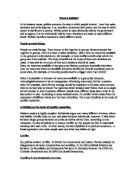Realism differs from liberalism in that according to realist theory, states are primarily motivated by maximizing their own interests, particularly military or economic power and security, whereas Liberalism doesn’t view international relations as a tense struggle for power between states so much as a system in which states are interdependent on each other for economic growth and security, and that an international society binds states and the people living in them together. The Liberal view assumes that trade is a better route to wealth than conquest, and that actors who gain economically from trade also gain power in international relations. Renowned international politics author and professor at Harvard University Joseph Nye Jr. (2008) notes that Realism responds to this criticism by quoting 17th century English realist Thomas Hobbes: “’Just as stormy weather does not mean perpetual rain, so a state of war does not mean constant war.”’ (p. 5)
Constructivism is a theory that puts international relations in the context of which aspects of it are socially constructed, meaning which aspects are shaped by social interaction. Constructivists analyze international relations by looking at the goals, threats, fears, cultures, identities, and other elements of "social reality" on the international stage as the of the actors. Alexander Wendt (1992) is the man most often credited with developing Constructivism. calls two increasingly accepted basic tenets of Constructivism: "(1) that the structures of human association are determined primarily by shared ideas rather than material forces, and (2) that the identities and interests of purposive actors are constructed by these shared ideas rather than given by nature.” (p. 64) Constructivism is often presented as an alternative to the two leading theories of international relations – and , but is not necessarily inconsistent with either. Wendt shares some key assumptions with leading realist and scholars, such as the existence of anarchy and the centrality of states in the international system. Wendt argues that Realism's 'structure' reveals very little: "it does not predict whether two states will be friends or foes, will recognize each other's sovereignty, will have dynastic ties, will be revisionist or status quo powers, and so on". (p. 65) Indeed, an important factor in determining if two states will be friends or foes are the individuals of those states, especially the leaders. Nye (2008) in his book Understanding International Conflicts cites the 1991 Gulf War in which Iraqi dictator Saddam Hussein was a critical factor in instigating as an example of an individual affecting international politics. (p. 36) Of course, the Gulf War example is just one of many throughout history of individual leaders dictating the course of states, which is not consistent with the Realist idea of the state itself being an individual in the international system. Essentially, what Constructivism adds to Realism and Liberalism is the view that individuals and the constitution of and the interaction in society has a much bigger effect on international relations than Realists and Liberalists have traditionally argued.
References
Morgenthau, H. J. (1985). Power and Principle in Statecraft: Six Principles of Political Realism. Random House, Inc (9th ed.), International Politics (p. 7-14). New York: Pearson-Longman.
Nye, J. S. (2008). Understanding International Conflicts: An Introduction to Theory and History (7th ed.). New York: Pearson-Longman.
Wendt, A. (1992). Anarchy Is What States Make of It. World Peace Foundation & Massachusetts Institute of Technology. (9th ed.), International Politics (p. 61-68). New York: Pearson-Longman.







